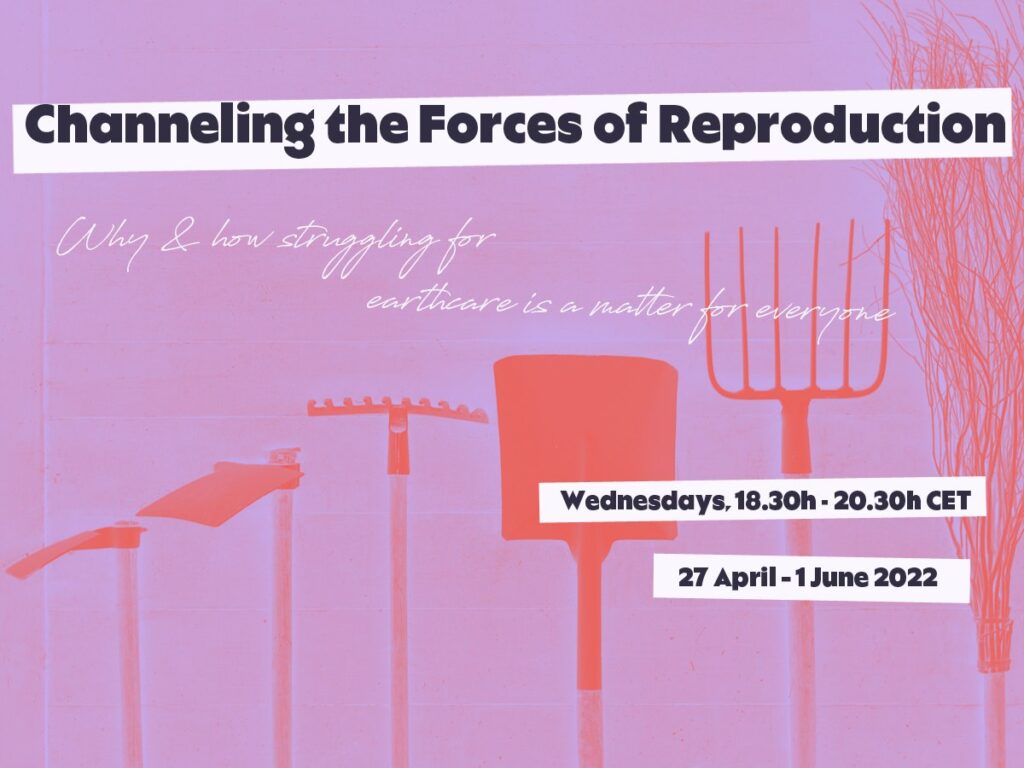Channeling the forces of reproduction
Why & how struggling for earthcare is a matter for everyone
With Stefania Barca (Uni Santiago de Compostela, ES), Pastora Filigrana (SAT, Red Antidiscriminatoria Gitana, ES), Jornaleras de Huelva en Lucha (ES), Sezonieri (AT), Widerstand am Tellerrand (CH), Yolanda del Carmen Areas Blas (ATC, CLOC-Via Campesina, NI), Amaranta Herrero (Barcelona City food strategy, ES), Manuela Zechner and Bue R Hansen (AT)

27 April – 1st June 2022, 6 sessions, wednesdays 18.30-20.30h CET, online (Zoom)
Content: This online course sets out to channel radical forces of care for the earth, by learning from&with feminist, agrarian, ecological and labour struggles. It’s a space of sharing experiences, concepts, and alliances, rooted in practice. We look to forge new common notions – earthcare labour, feminist and anti-racist social syndicalisms, agroecology, popular peasant feminisms and ecofeminism for example. These help us address why&how socio-ecological transformation and climate justice must pass through thinking earth and care together. We need Earthcare to avert the sectioning off of ‘nature’ from (agri)culture, to build and repair soils, defend communities and territories, align the struggle against exploitation of with the struggle against the exploitation of the land, to grow food commons as spaces of solidarity and resilience, and fight segregation by borders and capitalist migration regimes. This course will provide a space for learning and networking across different places and struggles – talking about the knowledges, alliances and strategies we need – and draws on Spanish, English and German language contexts.
Practical info: The course takes place online (via Zoom) and is open to 20 participants. Our working language will be English, with ample scope for translation. Each session comes with at least one reference text. There is no participation fee, but we expect engagement with the overall course – inputs will be recorded for participants who miss a session. At the end of the course, we will discuss conclusions, and possible next steps.
Course facilitation: Manuela Zechner and Bue Rübner Hansen
Who is this for: The course is open to anyone, but is likely of particular interest to activists, groups and organisations struggling for ecosocial justice (sign up with your mates!), as well as researchers and students. We welcome you bringing your own questions and concerns – alongside the main inputs, there will be much open space for conversation. Our aim is to use knowledges to strengthen our practices, mutually support each other in community and political work, and build towards a common vocabulary – for channelling the forces of reproduction in times of crisis and destruction.
To register, please fill in the form HERE – with a paragraph or two introducing yourself and your activity, questions and needs: we’ll get back asap!
Sessions:
Session 1 – 27 April 2022
The transformative potential of Earthcare labour and the Forces of Reproduction.
With Stefania Barca.
In this introductory session we present the overall course, and set out some first key concepts via the work of Stefania Barca. Stefania has recently published a book about how we might channel the forces of reproduction and build alliances across movements and practices, a key inspiration for this course. With her we will speak about the labours of environmental defenders, peasant farmers, climate activists, urban social movements and other actors of Earthcare – and about what connects them. We’ll speak about the labours this implies, how these challenge our ideas of work and environmentalism at the same time, and point to urgent alliances. We’ll talk about what relations and articulations we may need to forge to make Earthcare labour a force to reckon with, to build power across different struggles that seek to value and sustain life in our communities and on the planet. This session will start at 18h for all those interested in an informal round of introductions.
Stefania Barca is an activist, ecofeminist researcher focussing on the intersections of social justice, labour environmentalism, agrarian history, food politics and feminism, currently a professor at Universidad Santiago de Compostela in Spain. She has recently published Forces of Reproduction (Cambridge, 2020) and this co-reflection on ‘Ecofeminist Horizons’. See also our Earthcare fieldcast episode with Stefania.
Session 2 – 4 May 2022
Anti-racist and feminist social syndicalisms: struggles across agricultural fields and domestic care work in Spain.
With Pastora Filigrana.
This session is based on the new book “Del Campo a los Cuidados: el Sindicalismo Feminista y Antiracista que viene” which explores the potentials and challenges of feminist organizing across different spheres of social reproduction. Pastora will tell of feminist and anti-racist struggles emerging across agricultural workers and domestic care worker’s organizing in Spain. We’ll talk about how these fight for social rights and build solidarities and alliances where unions fail, constituting new forms of biosyndicalism that place life at the centre of politics. From such alliances, conceptualizations, and strategies we can learn ways out of the deadlocks of precarization and violence against women, gender-diverse people and migrants. We’re excited to provide a first and unpublished English translation of Pastora’s text – published via the new Laboratoria feminist research network – as part of this course.
Pastora Filigrana is a lawyer specialising in labour and union law, and immigration law. She is a member of the Andalusian Men’s and Women’s Workers Union (SAT) as well as of the Red Antidiscriminatoria Gitana, and has recently published Del Campo a Los Cuidados (La Laboratoria and Rosa Luxemburg Foundation, 2021) and El pueblo gitano contra el sistema-mundo. Reflexiones desde una militancia feminista y anticapitalista (Akal, 2020).
Session 3 – 11 May 2022
Learning from feminist & anti-racist organizing in industrial agriculture.
With Jornaleras de Huelva en Lucha (ES), Sezonieri (AT) and Widerstand am Tellerrand (CH).
This session brings together three vibrant feminist campaigns for agricultural worker’s rights, in ES/AT/CH. They fight for the rights of workers, be they seasonal/day labourers, local or migrant, undocumented or regularized. We’ll hear about regimes of importing agricultural workforces to the EU, the exploitation and sexual abuse that women face as they work in the fields, and the stories of feminist solidarity and mutual aid that led to three powerful campaigns. Discussing alliances within the broader labour movement and ecological struggles, we’ll also discuss how agricultural workers campaigns link with movements of food sovereignty, agroecology, feminism and climate justice, exploring common horizons and demands. This session translates across contexts and experiences in Spain, Austria and Switzerland, looking towards translocal solidarity and building broader support.
Jornaleras de Huelva en Lucha is a collective of women strawberry pickers from Spain and beyond, organizing in the agri-industry fields of Huelva, Spain. https://jornalerasenlucha.org/ Hear also our Earthcare fieldcast episode with them.
Sezonieri is a campaign for the rights of seasonal agricultural workers in Austria, a common initiative of the PRO-GE union, the Nyéléni forum for food sovereignty, the UNDOK alliance for union-based support of undocumented workers and other platforms for migrant, global and labour solidarity. https://www.sezonieri.at/ Hear also our Earthcare fieldcast episode with them.
Widerstand am Tellerrand is a Swiss-based campaign for the rights of migrant agricultural workers and for solidarity-based agriculture. https://www.widerstand-am-tellerrand.ch/ Hear also our Earthcare fieldcast episode with them.
Session 4 – 18 May 2022
The Popular and Peasant Feminisms of La Via Campesina: global feminist perspectives on agroecology and the need to join struggles.
With Yolanda Areas of La Via Campesina.
In this session we hear from some of the editors of the new publication on Popular and Peasant Feminisms of La Via Campesina, just out as report and graphic book. We speak about the global struggle to put women at the forefront of agroecological change, the kinds of processes this has implied within La Via Campesina, and how emerging horizons of ecology, earthcare, and ecofeminism need to look to and ally with peasant farmers for transformation. This is not just a matter of who feeds the world – we’ll hear about peasant’s and women’s key role in global food production – but also of how we must transform landscapes, territories, and soils in a just and sustainable way to face climate crisis. Hint: this is not done by separating nature from agriculture, but by struggling over land and property, to transform our mode of production.
Yolanda del Carmen Areas Blas is national coordinator of the Movimiento de Mujeres del Campo de la Asociación de Trabajadores del Campo ATC-Nicaragua, and is part the women’s cluster of CLOC-La Via Campesina, with more than 20 years experience working with women peasants in Nicaragua.
Session 5 – 25 May 2022
Ecofeminist perspectives across food webs and the politics of food and climate.
With Amaranta Herrero.
How can we reimagine and transform the relations between the city, peri-urban and rural dimensions? What ecofeminist proposals and municipalist public policies can we learn from for transforming our modes of food production and confronting the climate and ecological crisis? How may movements put pressure on institutions, and what demands might we make for food & climate justice? In this session we will get a broad picture of the key stakes and contradictions within food politics, from the concrete perspectives of an activist researcher working within the design of new municipal frameworks. We will also discuss regimes of knowledge production, what knowledges mean for strategies for transformation, and where we put our energies as collectives and individuals.
Amaranta Herrero is an ecofeminist sociologist and agricultural engineer who has studied and written about socio-ecological conflicts related to energy and food systems. She is currently coordinator of the Barcelona 2030 Sustainable Food Strategy and works for the Barcelona Strategic Metropolitan Plan (PEMB) of Barcelona City Council. Amaranta is a fellow traveller and advisor of the Common Ecologies school, sharing her long-term activist research experience and cross-institutional experience.
Session 6 – 1 June 2022
Concluding assembly.
Facilitated by Manuela Zechner and Bue Rübner Hansen.
Discussing and summing up what we’ve learned, fleshing out the new questions and challenges that have arisen, debating what paths of alliance, action and thinking that implies in our contexts and beyond. From this session, different reflexive texts may emerge for sharing with the broader world and continuing our discussions.
Sessions 2, 3 and 4 of this course are organized in cooperation with the MovE research project at Jena University.

